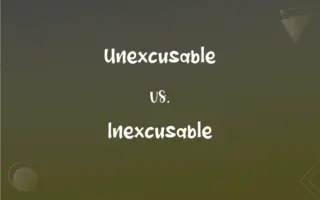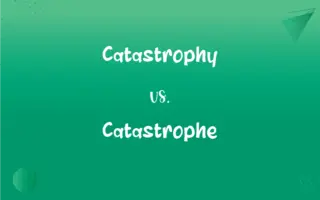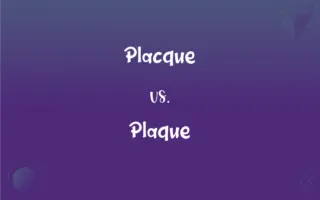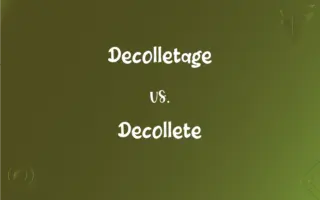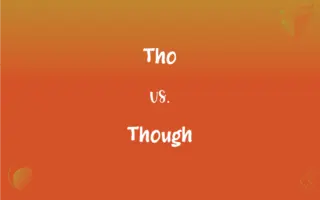Emaculate vs. Immaculate: Mastering the Correct Spelling
Edited by Aimie Carlson || By Janet White || Updated on March 14, 2024
"Emaculate" is not a standard English word and may be confused with "Immaculate," which refers to being extremely clean, neat, or free from fault.
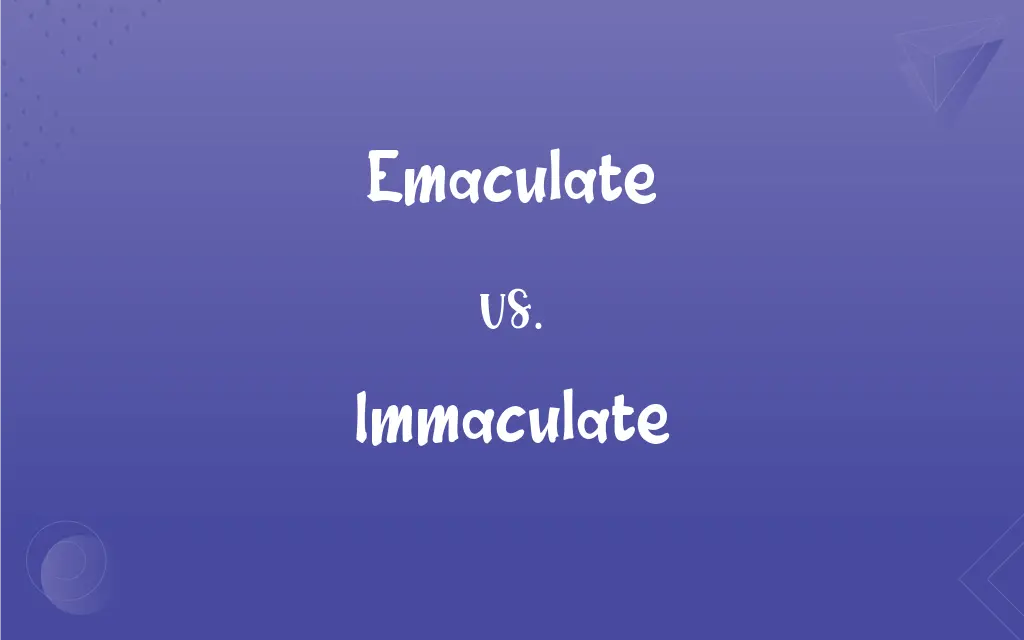
Which is correct: Emaculate or Immaculate
How to spell Immaculate?

Emaculate is Incorrect

Immaculate is Correct
ADVERTISEMENT
Key Differences
Recall that "immaculate" starts with "im-" which is a common prefix in English, unlike "em-."
Think of "maculate" as related to "macular," referring to a spot, and add "im-" for "without spot."
Associate "immaculate" with "immaculate conception," emphasizing its religious and cultural significance, aiding memory.
Visualize the word "immaculate" as embodying purity and cleanliness, helping to remember its spelling and meaning.
Break down "immaculate" into parts: "im" (not) + "maculate" (stained) to remember its meaning and spelling.
ADVERTISEMENT
Correct usage of Immaculate
He wore an emaculate suit to the interview.
He wore an immaculate suit to the interview.
Her handwriting was absolutely emaculate.
Her handwriting was absolutely immaculate.
The kitchen was emaculate after the deep clean.
The kitchen was immaculate after the deep clean.
The car's interior was kept in an emaculate condition.
The car's interior was kept in an immaculate condition.
The garden appeared emaculate in the spring.
The garden appeared immaculate in the spring.
Immaculate Definitions
Free from fault or flaw.
Her performance was immaculate.
Extremely clean.
The kitchen was immaculate.
Perfectly executed.
The painting was immaculate in every detail.
Precisely accurate.
His recollection of the events was immaculate.
Morally pure.
He led an immaculate life.
Immaculate Sentences
The presentation was immaculate, with every detail carefully considered.
The chef's uniform was perfectly immaculate, not a stain in sight.
They managed to keep the white carpet immaculate, even with two dogs.
The antique furniture was immaculate, showing no signs of wear.
His record collection is kept in immaculate condition, free of dust and scratches.
The hotel room was in an immaculate state when we arrived.
The soldier's uniform was immaculate during the inspection.
She always keeps her desk immaculate, with everything in its place.
Their new store's layout was immaculate, attracting many customers.
The beaches on the island were immaculate, with pristine white sand.
The completion of the project was immaculate, with no delays or issues.
The setting for the dinner was immaculate, with every detail perfectly in place.
The organization of the conference was immaculate, with no scheduling conflicts.
The coordination of the team was immaculate, leading to their victory.
The landscaped garden was immaculate, with every hedge neatly trimmed.
Her makeup was immaculate, applied flawlessly for the event.
The science experiment's results were immaculate, supporting the hypothesis perfectly.
The painting's restoration was immaculate, making it look as good as new.
The ballet performance was immaculate, executed with precision and grace.
She achieved an immaculate score on her exam, missing no questions.
The final draft of the report was immaculate, without a single error.
The harmony of the choir was immaculate, blending beautifully.
Their reputation is immaculate, known for consistent high-quality service.
The timing of the launch was immaculate, capturing the audience's attention.
The symmetry of the building's design was immaculate, pleasing to the eye.
Immaculate Idioms & Phrases
Immaculate timing
Perfectly chosen or occurring at the best possible moment.
Her entrance had immaculate timing, just as the music began.
An immaculate garden
A garden that is perfectly maintained, with no weeds or mess.
Their immaculate garden was the envy of the neighborhood.
To keep something immaculate
To maintain something in a state of perfect cleanliness or order.
Despite the challenges, she kept her reputation immaculate.
Immaculate condition
Being in perfect or near-perfect state, without any damage or dirt.
The vintage car was in immaculate condition, impressing all the collectors.
An immaculate record
Having a flawless history or performance.
The athlete maintained an immaculate record throughout the season.
An immaculate appearance
Looking extremely clean and neat.
For the job interview, he ensured his appearance was immaculate.
An immaculate performance
A flawless execution of a task or activity.
The pianist delivered an immaculate performance, receiving a standing ovation.
Immaculate precision
Extremely accurate, with no errors or flaws.
The craftsmanship of the watch was of immaculate precision.
Immaculate work ethic
A commitment to maintaining high standards in one's work.
His immaculate work ethic earned him rapid promotions.
An immaculate home
A home that is kept extremely clean and orderly.
Visitors were always impressed by her immaculate home.
FAQs
What does Emaculate mean?
"Emaculate" is not a recognized word in standard English.
Does Emaculate have synonyms?
"Emaculate" does not have synonyms as it is not a recognized word.
What are some synonyms for Immaculate?
Clean, spotless, and pure are synonyms for Immaculate.
Is Emaculate an adjective or a noun?
"Emaculate" is not a standard English term and so does not have a part of speech.
Does Emaculate have an established etymology?
No, "Emaculate" does not have an established etymology.
Can I use Emaculate in formal writing?
No, "Emaculate" is not a standard English term and should not be used in formal writing.
Is Emaculate a typographical error?
Often, "Emaculate" may be a typo for "emaciate," which means to become very thin.
Is Immaculate an adjective?
Yes, Immaculate is an adjective.
What does Immaculate mean?
Immaculate means extremely clean, neat, or free from faults.
Can Immaculate be used in religious contexts?
Yes, Immaculate is used in religious contexts like the Immaculate Conception.
What is the etymology of Immaculate?
Immaculate comes from the Latin word "immaculatus," meaning 'spotless.'
In what contexts is Immaculate commonly used?
Immaculate is used in contexts describing cleanliness, moral purity, and sometimes religious concepts.
Is Emaculate used in spoken English?
"Emaculate" is not commonly used as it is not a standard word.
Is it common to confuse Emaculate with Immaculate?
It's not common, but the similarity in spelling may cause some confusion.
How is Immaculate pronounced?
Immaculate is pronounced as /ɪˈmæk.jə.lət/.
About Author
Written by
Janet WhiteJanet White has been an esteemed writer and blogger for Difference Wiki. Holding a Master's degree in Science and Medical Journalism from the prestigious Boston University, she has consistently demonstrated her expertise and passion for her field. When she's not immersed in her work, Janet relishes her time exercising, delving into a good book, and cherishing moments with friends and family.
Edited by
Aimie CarlsonAimie Carlson, holding a master's degree in English literature, is a fervent English language enthusiast. She lends her writing talents to Difference Wiki, a prominent website that specializes in comparisons, offering readers insightful analyses that both captivate and inform.







